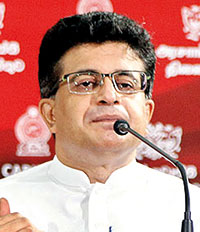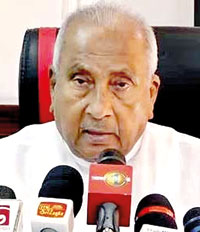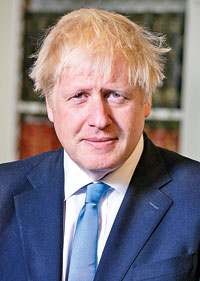Columns
Darkness at noon and dinner by candlelight
Thus, while the President was eulogising on the state of the nation in Parliament, Central Bank Governor Nivard Cabraal was busy settling the sovereign bond payment due that day. At 1.04 in the afternoon he tweeted the good news, “Sri Lanka has paid the USD 500 million sovereign bond that matured today (18),” beaming with the air of a man who had settled all his loans to the bank and was now free of debt.

ENERGY MINISTER GAMAMMANPILA: Bleak outlook
It was only for starters, though. Lanka had a further foreign debt of over USD 6 billion to be paid before the year ended. But for the moment, it sufficed. Lanka had survived the day, jumped the first hurdle in this marathon obstacle course.
Cabraal had every right to be elated, to savour a breather of a Pyrrhic triumph. It had not been easy for Finance Minister Basil Rajapaksa to have wrought the miracle, having taken four weeks of grovelling at the Indian Pantheon, beseeching before its altar for Indian succour, for his prayers to be answered.
But the exacting Indian deities had been in no mood or rush to shower their benevolence on such fickle a devotee who also prayed at a rival shrine. Before granting their grace, they had waited till Lanka was in the last throes of death to claim their pounds of flesh, no matter how much blood was spilled in the ghastly sacrificial offering.
While Parliament glowed pink to hear the nation’s future prospects spelt out as healthy and bright, while the Central Bank Governor in his office gloated on how he had staved off the nation’s bankruptcy with the manna from India, far, far removed from those august chambers of supreme power and high finance, the people of Lanka were more bent on bracing themselves to face darkness at noon and dinner by candlelight, and brave the return to the dark ages.
Not that it was not on the cards. Two months ago, experts had forecast that with the widespread showers then experienced subsiding by year end, the government will be compelled to impose power cuts due to fuel shortages caused by the dollar crisis.
But these warnings were pooh-poohed as ‘alarmists by a government anxious to keep the pretense that there had been no failure on its part to obtain this basic essential item on the household’s shopping list to provide the life blood of the nation’s economy and civilian life.
True to form, Power Minister Lokuge went into overdrive to assure the public there were no fuel shortages and, even if there were, God forbid, there was plenty of coal. Hence, he said, no power cuts for the whole of 2022. Consider the following report.

POWER MINISTER LOKUGE: Hollow assurances
On December 29, the Government owned Daily News reported: “Power and Energy Minister Gamini Lokuge in a special statement denied that there will be power cuts by mid-January next year. Minister Lokuge pointed out that the people should not be alarmed by such reports.
“The Minister further stated that the CEB has the ability to provide an uninterrupted power supply throughout the year and will do so through the coal power plants in the event of an oil crisis. He further stated that there will be no power outages due to a shortage of oil or coal except for power outages due to technical issues.”
But, despite there being power cuts, Minister Lokuge has continued to parrot ‘there will be no power cuts’; and, taking the escape route already devised, blamed any that occurred on breakdowns at power plants. The spate of power plant breakdowns is now happening at an alarming rate.
On January 11, even after the Ceylon Electricity Board (CEB) was sounding the alarm, Lokuge refused to pay any heed, and disdainfully ruled out any power cuts.
But with fuel stocks at CEB hitting an all-time low and the true state of the nation staring at his rotund face at the bottom of the tank, the Minister was forced to come to terms with reality. He found he was left with no alternative but to grudgingly admit he will be seeking the assistance of the Energy Minister to obtain sufficient oil to keep power plants alive.
But Energy Minister Udaya Gammanpila was in no mood to entertain his cabinet colleague’s request and saw in it his own chance to redeem himself in the public eye by striking a defiant pose. He rebuffed him outright, telling him to pay for it in dollars or be gone. Later, however, he relented and sent a two days’ supply of oil to the CEB.
On Sunday Minister Lokuge held a media conference where he, who had but only the week before repainted the vista of the country swimming in oil, was forced to admit finally the severe shortage of fuel plaguing the CEB. Looking pale and down hearted, he announced he had received 3000 tonnes of oil, sufficient for only two days. As a result, he said, there will be no power cuts till Tuesday the 18 of January.
 But what after the 18th? Minister Lokuge replied he will have to ask the Energy Minister again. But Energy’s Gammanpila, who seemed to be taking a macabre delight in Lokuge’s public humiliation, bluntly delivered a firm ‘no’. The following day, Monday, Lokuge appeared on TV, this time looking even more crestfallen. He announced that, with his request refused, he intended to ask the Lanka Indian Oil Corporation (LIOC) to procure fuel required for the next few days.
But what after the 18th? Minister Lokuge replied he will have to ask the Energy Minister again. But Energy’s Gammanpila, who seemed to be taking a macabre delight in Lokuge’s public humiliation, bluntly delivered a firm ‘no’. The following day, Monday, Lokuge appeared on TV, this time looking even more crestfallen. He announced that, with his request refused, he intended to ask the Lanka Indian Oil Corporation (LIOC) to procure fuel required for the next few days.
On the 18, Lokuge told the nation that the LIOC had also turned down his request for oil. Not even his ministerial presence and grovel had served to sway the Indian company to part with its oil for anything less than dollars on the nail.
During this nerve wracking period when the masses are kept in the dark of the true state of affairs, fobbed of by repeated ministerial assurances that all is well when it is most certainly not, where does the credibility of Government ministers lie, when the truth is finally out?
Can a Punch and Judy sideshow, with the two ministers bickering — one promising eternal light and the other forecasting damning night — over dollars and oil as if it were a private affair, while the Government acts as if the power crisis is none of its business and stays aloof, redeem poor economic management? No wonder the people are finding fast that the truth does indeed lie in the dregs when the froth and foam and lying spittle have been blown off?
Five ships bearing oil lay anchored off the coastline, unable to unload their cargo due to lack of dollars. On 18 Tuesday, the Indian High Commission in Colombo announced that India has provided Sri Lanka with a new US$ 500 million credit line to pay for fuel imports. Now with reinvigorated spirit, Lokuge told the media that the Central Bank would be releasing USD 30 million to buy fuel from the waiting ships.
But how much oil will 30 million dollars buy? With 1.6 million litres needed each day, not even 7 days, barely enough till next Monday. Ceylon Electricity Board Engineers Union Secretary Dhammika Wimalaratne, painting a rather bleak scenario of the power crisis, warns:
- The Sapugaskanda power plant and the Colombo Barge mounted plant at the Colombo harbour had heavy fuel only till January 22.
- The projected hydro power level was sufficient for little more than two months.
- Of the 38 coal shipments, only 22 had arrived and 16 were yet to come, due to delays in issuing Letters of Credit.
Certainly, it’s a bizarre way to run a country, where the Minister cannot guarantee fuel availability for more than a few days at a stretch. It’s akin to the state that has befallen many small restaurants and eateries, where the decision whether to stay open or close down for the day is dependent upon getting a gas cylinder — and one that will not, hopefully, explode — to fire its stoves for the day’s cooking.
And it’s not only fuel that is in want. Next it will be lifesaving medicine. Already the pharmaceutical industry has sounded the warning.
The Sri Lanka Chamber of the Pharmaceutical Industry (SLCPI) which imports nearly 80 percent of the medicines waved the red flag over a possible collapse of the industry. SLCPI warned: ‘There is no solution to the dilemma other than removing price control. As difficult as it may sound, the authorities will have to choose between having medicines at a cost and not having medicines at all.”
Health Minister Rambukwella, however, flatly turned down their request, telling the media on Monday, “Of course, I understand the difficulties experienced. However, price control as regards medicine cannot be done away with.”
Minister Rambukwella’s response is also understandable. He, too, no doubt, is constrained by the crippling lack of dollars. But has the Government, which still stubbornly refuses to seek IMF assistance, any coherent plan of its own for debt structuring or to generate forex except harbour a belief the dollars will somehow soon miraculously materialise? And the day will not be far off, when the people will be searching on foot for life-saving medication to add to the cart of shortages.
How long can the nation carry on like this, having to beg for another’s charity, pray for another’s grace merely to provide the basic essentials for bare human survival? What’s the point in ceremonial openings of expressways, again built on foreign loans, if the vehicles have no fuel to run on it? What’s the purpose of grandiose projects for the future alone if the present is shabbily ignored?
And what happens when charity dries out, and scorn replaces grace? When the family silver has been sold and not one jot is left to hock? Will that be the proper time to seek the succour of the IMF? Must the people wait till they’re falling halfway down the precipice for this Government to awake and shout for help?
Should Brit’s Boris go in God’s name or, for Lanka’s sake, stayBritish Prime Minister Boris Johnson is fighting for his political life for having attended a party in the garden at his official residence, No 10, Downing Street. The party organised by his staff members took place in mid-April, during the COVID lockdown. Worse. It was held on the eve of Prince Phillip’s funeral, when the nation, led by the Queen, was mourning his death.The opposition Labour Party is braying for his resignation. So are some of his own Tory backbenchers, with one of them telling him, ‘in the name of God go’. They claim that he had broken his own COVID rule he had set for the people: the ban on social gathering as a COVID prevention measure.  BORIS: ’Partygate’ row Boris Johnson, who was elected as Prime Minister in 2019, however insists he is innocent. He admits he attended the party, a farewell send off to a Downing Street colleague. But insists he did not know it was a party. While his explanation has triggered laughter, the British people seem not amused. But even if he had known, is his misdemeanour – similar to a schoolboy monitor caught at a midnight feast – justifiable cause to call for his resignation? Does the punishment that is sought fit the minor nature of the crime? Did his decision to attend the event, happening in his own backyard, cause serious damage to the nation? Did his decision plunge the country into a COVID nightmare, wreck the COVID prevention plan, spawn a Downing Street cluster that subsequently infected the entire British population, threaten people’s livelihoods, or result in mass suffering? No. On the contrary he is widely credited as the man who led the successful fight against COVID and led Britain out of the COVID siege. Yet he is being asked to resign for attending a party, for not setting the example. Pity. To lose a leader for an inconsequential trifle. So, should Britain’s PM Boris resign on a matter of principle which did not cause any damage nor throw the country into turmoil? Or should he stay, at least for Lankan politicians’ sake? | |
Buying or selling electronics has never been easier with the help of Hitad.lk! We, at Hitad.lk, hear your needs and endeavour to provide you with the perfect listings of electronics; because we have listings for nearly anything! Search for your favourite electronic items for sale on Hitad.lk today!


Leave a Reply
Post Comment